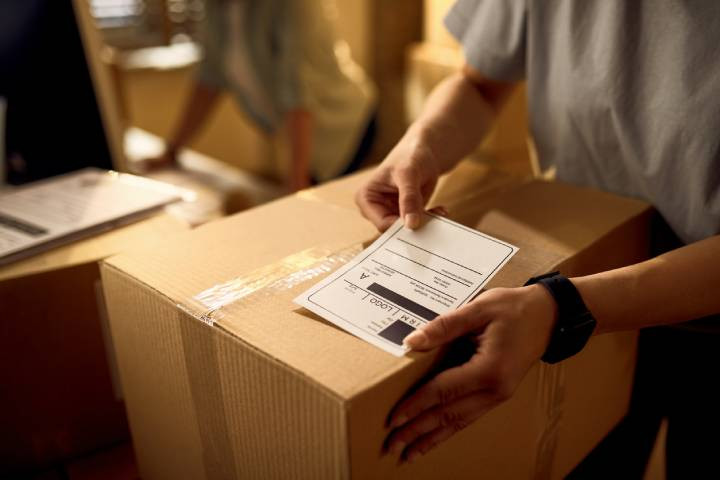Reelabels Unveils 5G Shipment Tracking Labels in the UK
Insights | 14-12-2023 | By Robin Mitchell
Recognising the challenges faced in the shipping industry, a UK-based company has recently announced the development of the world’s first 5G tracking labels, which are fully recyclable and easy to integrate into existing logistic supply chains. What challenges do asset trackers face, what has the company produced, and could this technology be critical in future logistics?

What challenges do asset trackers face?
It cannot be understated just how much modern technology has transformed modern life; large mechanical calculators have been replaced with high-speed microchips, computers that would take up entire buildings can now be integrated into a small watch, and the ability for devices to communicate across the planet means that no two computers are ever more than a second away from communicating. In fact, there are very few industries that modern electronics have failed to penetrate, with even the agricultural industry becoming data-driven and relying on complex electronic systems.
But, there are still a few industries that struggle to integrate electronics, with one major industry being logistics. Of course, you may be thinking that logistics has been massively transformed by electronics, and it has to a degree, with the help of automation systems, automatic parcel sorting, and tracking numbers that all help to simplify the logistics process all while giving customers the ability to see where their parcels currently are.
However, when it comes to goods in transit, there are no electronics involved whatsoever. Such goods rely on printed labels with a code that is scanned before being shipped, at facilities, and when delivered. While this may be suitable for low-valued items, goods that end up lost are completely untraceable and cannot be tracked.
One option is to incorporate a wireless device capable of connecting to networks that can record location data and stream this to a remote server. However, as such devices require a battery with a sufficient amount of charge, current battery technologies are not suitable for integration. For example, Lithium-ion batteries are great for providing ample amounts of charge in a small space, but as they carry a significant fire risk, they cannot be used with common shipping services.
Another challenge faced with such a tracking device is that as goods need to minimise weight as much as possible, large bulky circuits not only increase the weight but also increase the size of the surrounding packaging. Furthermore, the potential sensitivity of such circuits could also introduce reliability challenges and raise concerns when being checked by security stations.
Finally, as there are millions of packages sent around the world on a daily basis, the amount of e-waste that would arise from asset trackers would be monumental. While economies of scale would help to keep the costs down, the environmental impact would be detrimental. Furthermore, such an industry could rapidly see shortages of key materials commonly used in the electronics industry.
UK company Reelabels announces 5G labels
Recognising the challenges faced by logistic industries, a UK-based company has recently announced the development of smart asset trackers that allow for live-tracking of items in transit. The company, called Reelables, has managed to combine the benefits of printed electronics with a unique zinc battery technology that allows for an entire 5G asset tracker to be adhered to the inner layers of a standard thermal label commonly found in shipping industries.
This zinc battery, which is paper thin, not only provides sufficient power for the integrated electronics but is environmentally friendly. As such, the labels produced by Reelabel can go through the same recycling process as paper and cardboard. Furthermore, the use of zinc as the main battery material means that it doesn’t pose the same risks that other battery technologies, such as lithium-ion, present. Thus, they can be used in standard delivery methods, including land, air, and sea.
Once inserted into a regular thermal printer, the Reelabels can be activated either through printing or tapping with a smartphone, which reduces their complexity, and the lack of reverse logistics or additional logging makes using the labels simple. According to Reelabels, their labels are suitable not only for logistics but also for any application that may require some form of asset tracking, including retail.
Could this technology be critical in future logistics?
When seeing how the industry has changed over the past few years, there is no doubt that the labels developed by Reelabels are the future of logistics and asset tracking in general. As they are completely recyclable, utilising no heavy metals or toxic compounds, they are environmentally safe, and their minimal use of material allows for their mass production.
The integrated battery eliminates the need for external power sources, allows for the label to operate even in transit, and the use of zinc reduces the risk of fire. Finally, the use of 5G networks allows for the label to stay connected for extended periods of its journey, allowing users to not only track the label's location but potentially its environmental conditions in the future.
It is highly likely that these labels will grow in use and, if done right, could very well eliminate lost parcels entirely. Of course, whether or not such labels can scale is yet to be seen, but considering how every other industry has adopted electronics on an unimaginable scale, it is highly likely that they will certainly play a pivotal role in the future.

